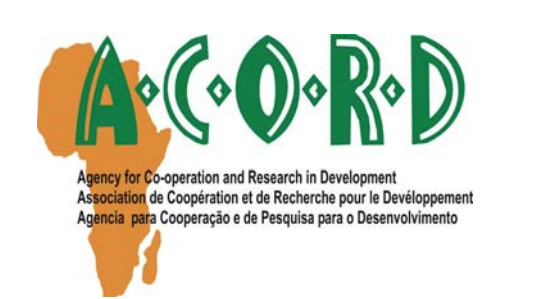Location
Founded over 30 years ago, ACORD is one of the oldest and largest Pan-African organisations. We work in 17 African countries to promote social justice and lift Africans out of poverty. ACORD works with more than one million Africans and 2000 partners on the continent and worldwide.
ACORD's vision is a society in which all citizens are able to achieve their rights and fulfil their responsibilities.
ACORD's mission is to work in common cause with people who are poor and those who have been denied their rights to obtain social justice and development and be part of locally rooted citizen movements.
Our work is guided by a number of fundamental values and working principles, chief amongst these is our belief that people themselves are the primary actors in their own development. Through the power of collective action African citizens have the ability to transform their future.
Members:
Resources
Displaying 1 - 3 of 3Rapport d’étude sur les pratiques d’expropriation, d’indemnisation, de délocalisation/réinstallation des communautés affectées par les projets miniers en Guinée
La République de Guinée recèle d'importantes ressources naturelles dont un potentiel minier reconnu comme l’un des plus importants en Afrique, le pays concentrant à lui seul plus de la moitié des réserves mondiales de bauxite (2/3 avant les découvertes récentes de grands gisements en Asie du Sud Est), d’importants gisements de fer (9 milliards de tonnes), de l’or, du diamant, du nickel, du cuivre et du titane.
10 Joint Policy Recommendations:
In 2003, the Maputo Declaration of the African Union stated that, within five years, 10 per cent of budgets of member states would be dedicated to agriculture. Ten years on, despite spending increases by some countries African governments still allocate an average of only 4 per cent of their national budgets to agriculture. Only eight out of 54 countries under the African Union have consistently reached the 10 per cent target.
Envelope 1 [Improving access to the safe shelters throughout providing minor and moderate repairing assistance
Objectives
ltpgtThe project aims to provide support to earthquake-affected communities in Harim district, Idleb governorate. It focuses on rehabilitating 796 minor-damaged apartments and 145 moderate-damaged apartments. The average cost per household is estimated at 500 USD for minor damage and 1300 USD for moderate damage. The project will benefit a total of 941HHs, 4680 individuals, including 1005 men, 1047 women, 1381 boys, and 1247 girls.ltbrgtBINAA and based on ongoing project with UNDP, is conducting a damage survey in Harim, Idleb, and Jisr-Ash-Shugur districts. Based on the results of the assessment, BINAA will rehabilitate 941 houses, with 656 houses in Tellemar and 280 houses in Milis (Milis: 312 W, 406 G, 300 M, 392 B - Tellemar: 735 W, 841 G, 705 M, 999 B). The rehabilitation assistance will be determined based on verified information regarding household vulnerability and the availability of housing and land ownership documents. The rehabilitation cost will be determined according to the level of damage.ltbrgtThe selection of the project locations in Harim district was based on a Multi-Sector Needs and Vulnerability Assessment (MSRNA) conducted by BINAA. After analyzing the results, BINAA found that the chosen locations had the highest level of vulnerability. The selection was further validated through Focus Group Discussions (FGDs). Although other locations are also in need, BINAA will coordinate with the cluster and other partners to address the gaps.ltbrgtAs a contingency plan, BINAA has identified additional locations affected by the earthquake. These locations will undergo technical damage assessment by BINAA/UNDP ongoing project if any problems or overlaps arise in the targeted areas.ltbrgtIn addition to providing direct aid, the project emphasizes the collection and analysis of data and information to understand the extent of the damage and determine the most effective ways to support the affected communities. This approach ensures that the assistance provided is targeted and has a lasting impact on those in need.ltbrgtBINAA's technical team will conduct rehabilitation and maintenance work on lightly and moderately damaged buildings based on the results of the technical evaluation. The scope of work includes debris removal, structural repairs, fixing toilets, windows, doors, stairs, and providing water tanks and sanitary facilities. Local contractors will be engaged to carry out the repair works, enabling the use of local materials and manpower and supporting the local market. Special considerations will be made for households with disabled persons, including disability-friendly entrances and toilet facilities.ltbrgtUpon completion of the rehabilitation work, BINAA will coordinate with local communities for the proper handing-over process of the rehabilitated houses. A certificate of completion will be signed by all involved entities, ensuring transparency and accountability in the project implementation.ltbrgtlt/pgt




